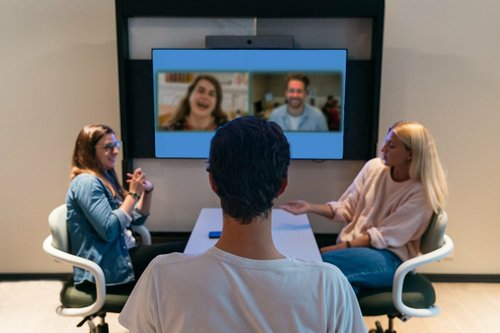Six tips for a successful phone interview
Mar 24, 2020
4 mins

IN
After selecting job applicants from their résumés, an increasing number of recruiters are conducting a telephone interview to decide whether potential candidates will make it to the next round, a face-to-face interview. Whether it’s for an internship or permanent employment, in marketing, finance, or even engineering, there’s no escaping the rise in popularity of the telephone interview. You will have 15 to 20 minutes to win the recruiter over—this is your chance to show them you’re exactly what they need. Here, Welcome to the Jungle explains how to nail that telephone interview in six simple steps:
Don’t pick up the phone
Focus on your skills
Arm yourself with written resources
Listen and then respond
Sound convincing
Put some thought into your final words
1. Don’t pick up the phone
You’re looking for a job and have applied for several vacancies. You’re waiting for someone to get back to you, then out of the blue, an unsaved or unknown number calls you. It looks like it might be a recruiter! Don’t rush in. If you pick up the phone straight away, you will probably waste a few precious minutes trying to remember the job description, what the company does, any specific information, and so on, and your interview will get off to a shaky start. Have you already answered? Then say that you are busy, take their contact details, and ask them when you can call them back. Ideally, wait for the person to leave a voice message to find out who they are, the company, and the vacancy they are calling about. Remember to make sure your voicemail greeting is serious and professional.
Take your time to gather all the information you need and get yourself in the best possible position—have your notes at hand, make sure you are in a quiet place and have optimal network coverage, and so on—so you are relaxed and focused before calling back. This exchange will be your first initial contact with the company so you do need to make a good impression.
Alternatively, if you have already arranged a telephone appointment with the recruiter, make them the priority at that point in time. However, if they leave you waiting for 10 or 15 minutes, take the initiative and call them yourself. This will show how motivated you are.
2. Focus on your skills
If a recruiter calls you, it means your résumé has already caught their eye. However, there are likely to be several strong candidates for the same vacancy and the interviewer needs to hear your motives to confirm that you really are the right person for the job. They have your résumé in front of them, so there’s no need to give them a full career history. Instead, highlight the key elements on your résumé that complement the company and the vacancy in question. In addition, know that your hobbies and interests matter and make you stand out from the crowd, such as high-level sports activities or charity work. They say as much about you as a qualification or professional experience.
Unlike a face-to-face interview, the recruiter is 100% focused on your voice, which means they will remember the details of your conversation even more. When they hang up they should be saying to themselves: “Right, I really want to meet that person!”
3. Arm yourself with written resources
One of the advantages of a telephone interview is that nobody can see what you’re doing, so you can have everything you need right in front of you. It’s important to have a copy of your résumé and cover letter, a list of your key skills and achievements, and the job description at hand to remind you of the expected requirements.
You should have also done some background research on the company and noted its main activity, key customers, and what attracts you to them. Keep these extra notes in front of you. Use them but try not to read them—act natural!
4. Listen and then respond
When we are stressed or nervous, we tend to focus on our own words and speak quickly. We try to avoid awkward silences and often forget an essential point: an interview is supposed to be an exchange! Even if it is incredibly tempting to respond straight away, listen to the recruiter, stay level-headed and try to be focused. This will also stop you from making a fatal mistake: cutting the other person off. Silences aren’t the end of the world, they give an interview structure. By listening to the silences, you may be able to detect the interviewer’s interest in certain parts of your career path, or even detect their boredom, and thus change direction or your approach.
Listening also means being proactive, taking an interest, and responding by asking questions. Make sure you prepare them! The recruiter also has to convince you that you want the job, so ask for all the information you need to make an informed decision.
5. Sound convincing
Whenever you’re on the phone, your best asset is your voice and its tone. There’s nothing worse than having a weak, monotonous voice on the other end of the line. A little tip: did you know that gestures and facial expressions affect the sound of your voice? It is paramount that you behave as if you are in a face-to-face interview. If you’re sitting down, sit up straight as if you were in an interview room because if you’re slouching on your couch, they will tell! Using headphones can help because your hands are free to take notes or to make gestures.
Appear dynamic by staying calm, take breaks to give rhythm to your speech and vary the volume of your voice. Try to articulate, speak clearly, and have a consistent and coherent voice to come across as confident and professional.
You’ve probably heard this before, but smiles can be heard on the phone, so do it! A smile will make a big impact on anything that you say.
6. Put some thought into your final words
Always thank the recruiter and ask about the rest of the process. If you can, try to finish on a positive note and arouse the recruiter’s curiosity. Save some striking information for the end: perhaps you know one of the recruiter’s colleagues? Do you have a conference or seminar in common? Your last words are the ones that will stay in the recruiter’s head after you hang up, so don’t slack off toward the end of the conversation.
Finally, don’t forget to send a thank-you email afterward to show that you are still interested in the job and reiterate your willingness to meet the recruiter in person. And hopefully, after following these tips, you’ll get to do exactly that.
Translated by Mildred Dauvin
Photo: Welcome to the Jungle
Follow Welcome to the Jungle on Facebook, LinkedIn, and Instagram, and subscribe to our newsletter to get our latest articles every day!

More inspiration: Remote job interviews

‘I had a hybrid job interview — and it was a total nightmare!’
Arthur had one in-person interview and two by video call. He shares what was likely one of the worst moments in his professional life.
Jan 04, 2022

What to expect from a pre-recorded job interview
How to prepare for a pre-recorded job interview.
May 15, 2020

How to Prepare for a Video Interview
Landed a job interview via video with your dream company? Here are 5 tips on how to prepare for a successful video interview.
Nov 14, 2019
The newsletter that does the job
Want to keep up with the latest articles? Twice a week you can receive stories, jobs, and tips in your inbox.

Looking for your next job?
Over 200,000 people have found a job with Welcome to the Jungle.
Explore jobs